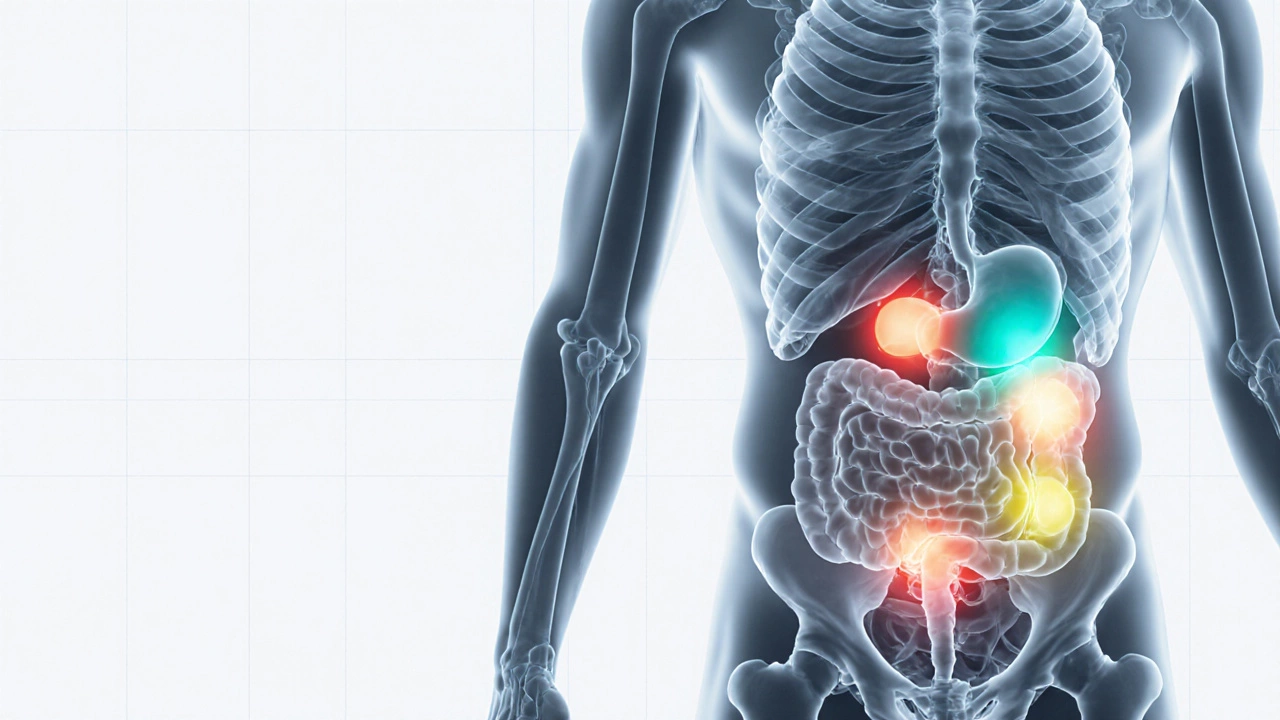
Early Cancer Warning Signs Checker
Please answer yes/no to the following symptoms:
Persistent Fatigue
Feeling extremely tired even after resting
Unexplained Weight Loss
Losing more than 5% of body weight without trying
New or Worsening Pain
Pain lasting more than 3 months or not relieved by over-the-counter medicine
Shortness of Breath
Difficulty breathing during minimal activity or at rest
Skin Changes
Yellowing skin, easy bruising, or unusual texture
Loss of Appetite
Reduced desire to eat or altered taste sensation
Symptom Analysis Results
When cancer progresses, the body can start sending subtle alarms that something is seriously wrong. Knowing those alarms makes it easier to get help before the situation becomes critical. Below you’ll find the most common first signs that your body is shutting down from cancer, why they happen, and what you should do about them.
Understanding the core problem
Cancer is a group of diseases where abnormal cells grow uncontrollably and can invade nearby tissues or spread to distant organs. As tumors grow, they steal nutrients, produce harmful chemicals, and can damage organ function. Over time, many patients develop cachexia, a complex metabolic syndrome marked by severe muscle and fat loss, weakness, and loss of appetite. Recognizing early warning signs means you can intervene with nutrition support, symptom management, or a change in treatment strategy.
1. Persistent, overwhelming fatigue
Fatigue is a deep, unrelenting tiredness that doesn’t improve with rest. Cancer‑related fatigue often feels heavier than ordinary tiredness and can appear suddenly. It results from anemia, inflammatory cytokines, or the tumor’s energy drain. If you notice that a simple walk leaves you breathless and you need to nap multiple times a day, it’s a red flag.
2. Unexplained rapid weight loss
Unexplained weight loss is a loss of more than 5% of body weight over 6-12 months without intentional dieting. In cancer, this often reflects cachexia. The body burns muscle for energy, leading to a gaunt appearance, especially around the ribs and jawline. Track your weight weekly; a sudden drop is a clear warning sign.
3. New or worsening persistent pain
Persistent pain is pain that lasts longer than three months and is not relieved by usual over‑the‑counter meds. Tumors can press on nerves, bones, or organs, creating localized or radiating pain. If pain becomes constant, intensifies at night, or spreads to new areas, it often indicates disease progression.

4. Shortness of breath or coughing
Shortness of breath is difficulty breathing that occurs during minimal activity or at rest. Lung involvement, fluid around the lungs (pleural effusion), or anemia can cause this symptom. A dry cough that won’t go away may also point to tumor irritation.
5. Changes in skin color or texture
Skin changes are yellowing, bruising, or a hard, leathery feel that appears without injury. Liver metastasis can cause jaundice (yellow skin), while low platelet counts from bone‑marrow involvement lead to easy bruising. Any new discoloration warrants immediate medical attention.
6. Loss of appetite and altered taste
Loss of appetite is a reduced desire to eat, often accompanied by a metallic or bitter taste. Cancer cells release substances that affect the brain’s hunger signals. When meals become unappealing and you start skipping them, it accelerates weight loss and weakens the immune system.
7. Persistent fever or night sweats
Unexplained fevers above 38°C (100.4°F) that recur, especially at night, can signal infection or a tumor‑induced inflammatory response. Night sweats that soak clothing and sheets are another clue that the body is fighting something internally.

Quick reference table
| Sign | Typical in Cancer | Frequency in Advanced Cases | Why It Matters |
|---|---|---|---|
| Fatigue | Persistent, worsens at night | 80% | Indicates metabolic overload |
| Unexplained weight loss | 5%+ loss in weeks | 70% | Sign of cachexia |
| Pain | Constant, unrelieved by OTC | 65% | Shows tumor invasion |
| Shortness of breath | Occurs at rest | 55% | May mean lung or heart involvement |
| Skin changes | Jaundice, easy bruising | 40% | Suggests organ metastasis |
When to seek professional help
If you notice any combination of the signs above, schedule a medical appointment within 24-48hours. Early intervention can lead to palliative measures that improve quality of life and, in some cases, extend survival. Bring a symptom diary, list of medications, and recent weight measurements to the appointment. Your healthcare team may order blood work, imaging, or refer you to a nutritionist or pain specialist.
How to manage symptoms at home while awaiting care
- Stay hydrated: Aim for at least 2‑3L of water daily unless fluid restriction is advised.
- Small, frequent meals: Blend protein‑rich smoothies if solid food feels unappealing.
- Gentle activity: Light stretching or short walks can reduce fatigue without overexertion.
- Cooling techniques: Use a fan or cool cloth for night sweats.
- Pain log: Record pain intensity, triggers, and relief methods to help clinicians fine‑tune treatment.
Why cancer early signs matter more than you think
Detecting the body’s first distress signals gives you a window to act-whether that means adjusting chemotherapy, adding supportive drugs, or initiating hospice care to keep comfort high. Ignoring subtle cues often leads to emergency hospitalizations, which are harder on the patient and family.
Frequently Asked Questions
Can fatigue be caused by something other than cancer?
Yes, fatigue can stem from anemia, thyroid issues, depression, or medication side effects. However, when fatigue appears suddenly, is severe, and coincides with other warning signs, cancer should be considered and evaluated.
How fast does cachexia develop?
Cachexia can progress over weeks to a few months, especially in advanced lung, pancreatic, or gastric cancers. Early nutritional intervention can slow muscle loss, but the syndrome is often irreversible once severe.
Is shortness of breath always a sign of lung cancer?
No. It can also arise from heart failure, anemia, infections, or simple deconditioning. In cancer patients, however, new dyspnea should prompt imaging to rule out tumor spread or pleural effusion.
When should family members call emergency services?
If symptoms include sudden severe pain, uncontrolled bleeding, breathing difficulty that worsens rapidly, or a fever above 39°C (102.2°F) that does not respond to acetaminophen, call emergency services immediately.
Can lifestyle changes reverse these early signs?
Lifestyle tweaks-like improved nutrition and modest exercise-can alleviate fatigue and help maintain weight, but they cannot reverse tumor‑driven metabolic changes. Medical treatment remains essential.
Categories
Popular Articles

Mar 10 2025

Jan 31 2025



